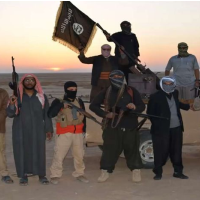Iraq Crisis: Modi Government Faces First Major Challenge
 Militants of the Islamic State in Iraq and al-Sham (ISIS)
Militants of the Islamic State in Iraq and al-Sham (ISIS)
40 Indian construction workers are taken hostage in Mosul, a group of Indian nurses remains holed up in their hospital in Tikrit, and the spectre of oil hitting $120 a barrel – the Iraq crisis has snowballed into the first major challenge for the Modi administration.
No one as yet knows who has abducted the Indian workers – there has so far been no ransom demand – although the Indian government announced on Thursday that the Iraqi government had identified the location where they were being held captive.
The workers are mostly from Punjab and were employed with a Baghdad-based construction company, Tariq Noor Al Huda. Reports seem to indicate that they were abducted while being evacuated to Kurdish-controlled territory.
According to The Hindu newspaper, the workers may not be in immediate danger, as their captors do not appear to be militants from the Islamic State in Iraq and al-Sham (ISIS), but Sunni tribesmen with whom they have a tactical alliance.
Indians are not the only foreigners taken hostage as the rebel forces have overrun a large part of northern Iraq in recent days. Turkey's Dogan news agency reported that sixty people, including workers from Turkey, Pakistan, Bangladesh, Nepal and Turkmenistan, have been abducted near Kirkuk. Insurgents also seized eighty Turkish nationals in Mosul last week.
There are about 10,000 Indian nationals currently in Iraq, but only 100 are trapped in the areas overrun by ISIS. The Indian government is in touch with many of them and has despatched Suresh Reddy, a former ambassador to Iraq, to Baghdad to support repatriation efforts.
The Indian government is not alone in scrambling to react to the violence in Iraq. The main stakeholders – the United States of America, the Iraqi government of Nuri al-Maliki, as well as regional powers like Iran and Saudi Arabia – have all been taken by surprise by the rapid advance of ISIS.
Yet India has little chance of influencing events - its diplomatic clout in the fast-changing Middle East is almost non-existent. So one wonders what the government can realistically do to protect Indians in Iraq if the situation does degenerate into a Sunni-Shia war.
Meanwhile, global crude oil prices that have already reached $115 a barrel could hit $120 over fears of disruption in Iraq’s oil supplies. This would hamper the Modi administration’s plans to revive the Indian economy, just weeks before it presents its maiden budget.
For every dollar rise in oil prices, the government’s subsidy bill jumps by $7.5 billion. A prolonged rise in oil prices would therefore make it impossible for the fiscal deficit to be pruned to the targeted 4.1% of GDP in 2014-15.
According to the Hindustan Times, the new administration has to deliver quickly on its promises to cool inflation and create jobs. But with persistently high inflation and borrowing rates, it already had very limited space to manoeuvre. The Iraq crisis has just made that job even more difficult.
- Karan Singh
- Top Stories
- Controversies
- Where is the Money Going?
- India and the World
- Appointments and Resignations
- Unusual News
- Latest News
- India College Chain’s Expansion into U.S. Draws Opposition from Massachusetts Officials over Quality of Education
- Milk Shortages in India Tied to Release of New Movies Featuring Nation’s Favorite Stars
- Confusion Swirls around Kashmir Newspaper Ban in Wake of Violent Street Protests
- Polio-Free for 5 Years, India Launches Vaccine Drive after Polio Strain Discovery
- New Aviation Policy Could Increase Service, Lower Ticket Prices






Comments